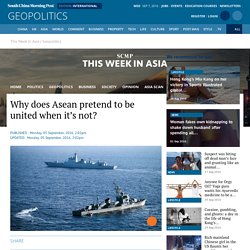

ASEAN and China need to put aside disputes, promote economic cooperation. It seems that China's relations with the Association of Southeast Asian Nations (ASEAN) are likely to be back on track after difficulties triggered by the South China Sea issue.
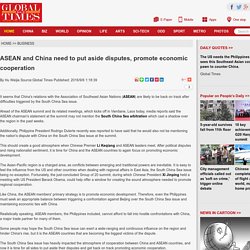
Ahead of the ASEAN summit and its related meetings, which kicks off in Vientiane, Laos today, media reports said the ASEAN chairman's statement at the summit may not mention the South China Sea arbitration which cast a shadow over the region in the past weeks. Additionally, Philippine President Rodrigo Duterte recently was reported to have said that he would also not be mentioning the nation's dispute with China on the South China Sea issue at the summit. This should create a good atmosphere when Chinese Premier Li Keqiang and ASEAN leaders meet. After political disputes and rising nationalist sentiment, it is time for China and the ASEAN countries to again focus on promoting economic development. The Asian-Pacific region is a charged area, as conflicts between emerging and traditional powers are inevitable. ASEAN Summit May Bow to Chinese Pressure on South China Sea. VIENTIANE, Laos — Southeast Asian leaders are likely to avoid any official mention at a summit this week of an arbitration ruling that shot down China's expansive territorial claims in the South China Sea, according to a draft of their final declaration, in a victory for Beijing's diplomatic clout.
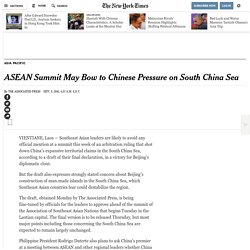
Unity, economic growth and terrorism: 3 challenges facing ASEAN, says PM Lee. VIENTIANE, Laos: The Association of Southeast Asian Nations (ASEAN) faces three challenges, Singapore Prime Minister Lee Hsien Loong highlighted on Wednesday (Sep 7).
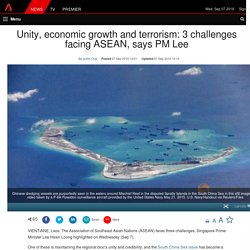
Why ASEAN Is Here to Stay and What That Means for the US. As U.S.
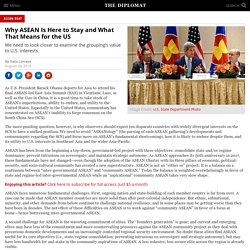
President Barack Obama departs for Asia to attend his final ASEAN-led East Asia Summit (EAS) in Vientiane, Laos, as well as the G20 in China, it is a good time to take stock of ASEAN’s imperfections, ability to endure, and utility to the United States. Especially in the United States, commentary has concentrated on ASEAN’s inability to forge consensus on the South China Sea (SCS). The more puzzling question, however, is why observers should expect ten disparate countries with widely divergent interests on the SCS to have a unified position. We need to avoid “ASEANology” (the parsing of each ASEAN gathering’s developments and communiqués regarding the SCS) and focus more on ASEAN’s fundamental shortcomings, how it is likely to endure despite them, and its utility to U.S. interests in Southeast Asia and the wider Asia-Pacific. Enjoying this article? ASEAN faces numerous fundamental challenges. A second challenge for ASEAN is the wavering commitment of elites.
Going beyond the economy in the ASEAN community - The Jakarta Post. The ASEAN Political-Security Community (APSC) was first proposed by Indonesia in 2003 to balance the Singapore-proposed ASEAN Economic Community.
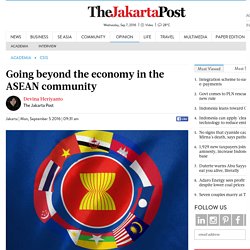
However, it remains lagged more than a decade later as it still struggles to achieve any balance. APSC becomes the main topic for a panel consisting of three experts from three different ASEAN member states, in a discussion being held on Thursday to commemorate the 45th anniversary of the Centre of Strategic and International Studies (CSIS). Vietnam’s evolving role in ASEAN: From adjusting to advocating. ASEAN’s repetitive failure in the South China Sea matters The controversial China-ASEAN Summit in Kunming on June 16th cast a shadow on the Association of Southeast Asian Nations’ (ASEAN) unity, centrality, and relevance.
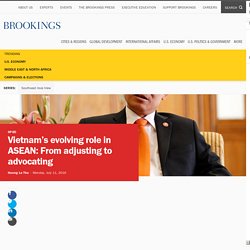
This is not the first time that this group of 10 has been tested in its interaction with China. From the ‘signature’ failure of the 2012 Cambodian chairmanship of ASEAN to the more recent four-point consensus, in all of those cases, the South China Sea disputes were the key point of pressure, whether mentioned or explicitly omitted. While there is a growing tendency to criticize and even discredit ASEAN as a whole, I argue that there is a need to have a more granular look at the intra-ASEAN dynamics. The need to keep ASEAN relevant, it seems, is better understood among some members than others.
There are a number of reasons why at this junction of time, Vietnam’s position has become more critical. Hanoi’s strategic imperatives Get East Asian policy updates from Brookings. Is It Time for a Peacekeeping Force for ASEAN? - The Asia Foundation. This decade marks a radical shift in the Association of Southeast Asian Nations (ASEAN) member states’ attitudes toward its role in the region.
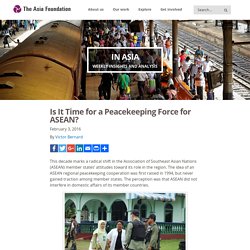
The idea of an ASEAN regional peacekeeping cooperation was first raised in 1994, but never gained traction among member states. South China Sea crisis presents opportunity for ASEAN-China: PM Lee. VIENTIANE, Laos: The strained relations between the Association of Southeast Asian Nations (ASEAN) and China due to South China Sea disputes can be harnessed into continued economic growth, said Singapore Prime Minister Lee Hsien Loong on Thursday (Sep 7).
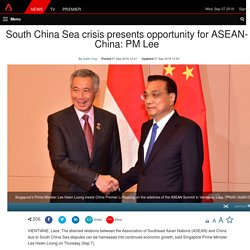
ASEAN members like the Philippines and Vietnam are currently in dispute with China over claims to parts of the South China Sea. Speaking at the ASEAN-China Summit to commemorate the 25th anniversary of the two parties' dialogue relations, Mr Lee reminded those in attendance - including China Premier Li Keqiang, whom he met on Wednesday - that "even in the strongest of relationships, issues will arise from time to time". "One such issue is the South China Sea. However, every crisis presents an opportunity," said Mr Lee. "This issue can be turned to our advantage in pursuit of the common goal of regional peace and stability, which are essential prerequisites for continued economic growth.
" Why does Asean pretend to be united when it’s not? Southeast Asian leaders divided over Beijing’s territorial claims in the South China Sea will seek to paper over frayed ties and present a united front at a summit with world powers in Laos next week, observers say.
